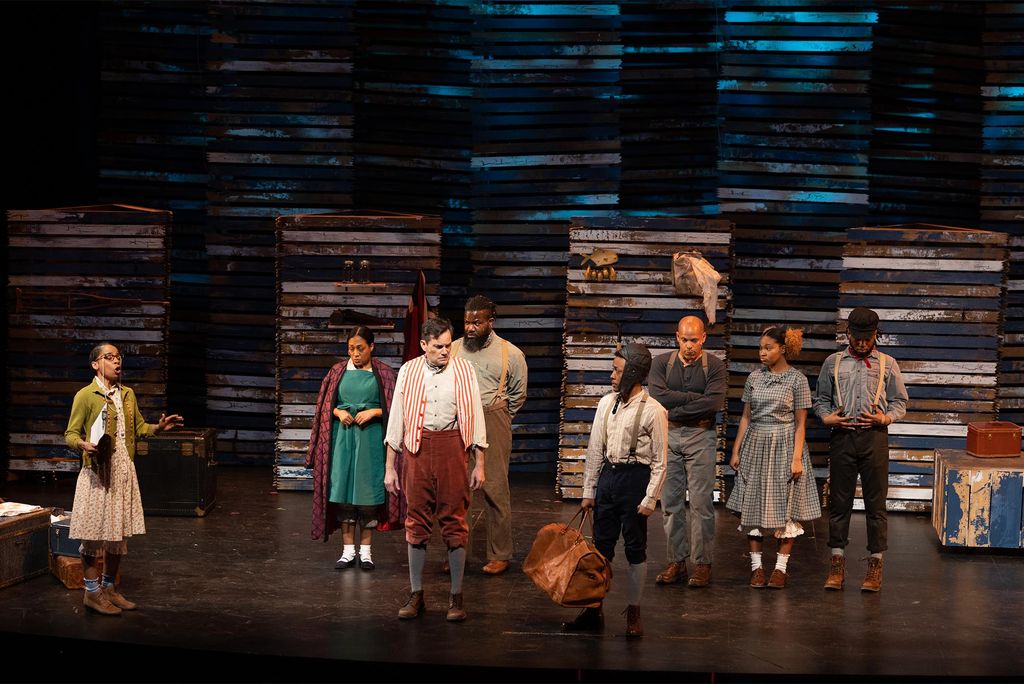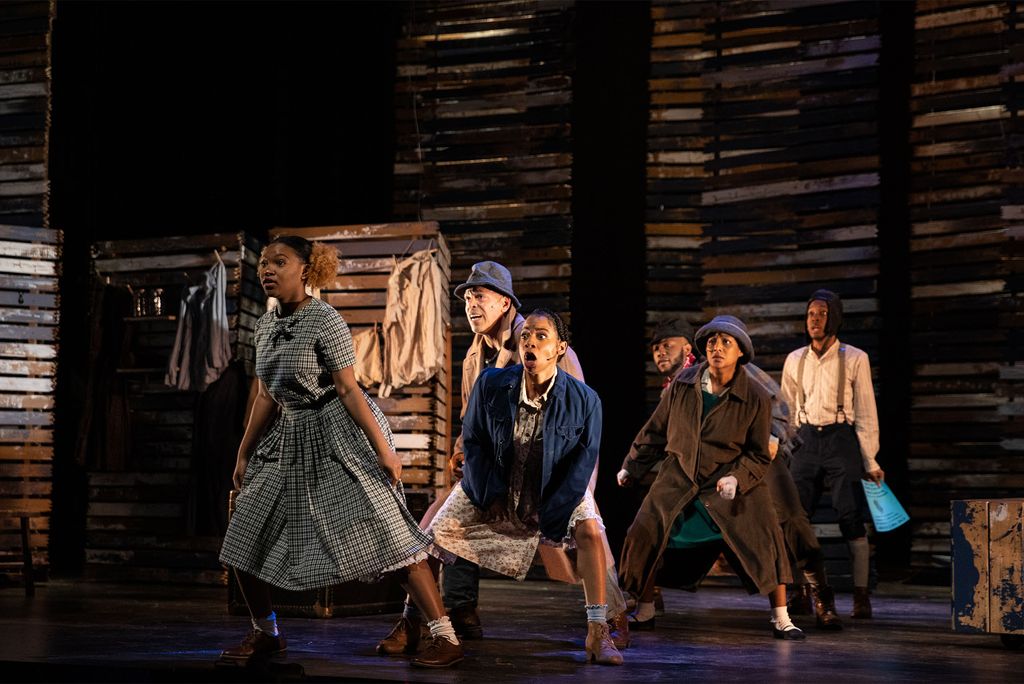Bud, Not Buddy Closes Out Wheelock Family Theatre’s 2022–2023 Season

Bud, Not Buddy Closes Out Wheelock Family Theatre’s 2022–2023 Season
Theatrical adaptation of award-winning book is a story of love and perseverance, set during the Depression
Anderson Stinson, III (center) plays the title character in Wheelock Family Theatre’s production of Bud, Not Buddy, based on the award-winning book by Christopher Paul Curtis, on stage through May 14.
This article was first published in BU Today on April 14, 2023. By John O’Rourke. Photos by Jake Belcher
Four years ago, as Emily Ranii was putting together Wheelock Family Theatre’s 2019–2020 season, she decided that the final show would be a theatrical adaptation of Bud, Not Buddy, the award-winning children’s book by Christopher Paul Curtis about a 10-year-old Black boy who goes in search of the father he’s never met.
Set in Michigan during the Depression, the novel recounts Bud’s odyssey as he travels more than 100 miles to find the man he believes to be his father. Along the way, he witnesses racism, poverty, and homelessness, but also encounters the kindness of strangers who help him on his quest. Since its publication in 2000, the book has become a staple of school curricula across the country and was the recipient of both the Newbery Medal and the Coretta Scott King Award.
Ranii (CFA’13), artistic director of WFT, knew that the play’s themes would resonate with children ages 8 and up.
“That quest for family and home felt like it was right in line with our mission,” she says. “There’s so much love in it, there’s so much hope.”
The show offered Ranii a chance to collaborate with someone she had long admired: Dawn Simmons, founder and co-artistic director of Front Porch Arts Collective, the award-winning, visionary Black theater company dedicated to advancing racial equity in Boston. Simmons agreed to direct, and immediately started planning the production.
“We’d been working with designers, we had cast the show, we had done just about everything,” Simmons recalls. “We were supposed to go into rehearsal in March of 2020 and then everything shut down.”


pandemic turned into a three-year delay. Now, the show is getting the production that Simmons and Ranii have long envisioned. Bud, Not Buddy opens tonight, April 14, for a monthlong run.
Simmons says she believes the main reason the book has connected so deeply with young readers is that at its core, it’s a story about perseverance.
“Bud is resilient,” she says. “He finds a way. He can bring this under his control even though it’s not always the way he would like. He is active and present in his own life. And he has a sense of adventure and wonder. We’re watching a young person figure it out, and in the end, you know he’s going to be OK.”
Unlike most Wheelock Family Theatre productions that prominently feature children, Bud, Not Buddy has actors in their early 20s playing the kids’ roles.
“There’s some nuance in the storytelling that a very young person might not have,” Simmons says. “The idea of putting an actual 10- or 13- or 15-year-old through the reminder that your mother has passed, your grandfather was emotionally hard—an adult can handle those conversations and bring their perspective of lived experience to how they attack that role. I think the shading that they’ll be able to bring to the role will help bring some nuance to their performances.”
Bud is played by 24-year-old actor Anderson Stinson, III, who graduated from Brandeis University three years ago. Stinson has played a range of roles, including Antipholus of Syracuse in the Actors’ Shakespeare Project’s staging of The Bomb-ity of Errors, a rap musical adaptation of Shakespeare’s The Comedy of Errors. He says that Bud is the most difficult role he’s played to date.
“Bud being an orphan, he has dealt with a lot of things I have not dealt with,” Stinson says. “So, I think there’s sort of a struggle there for me, where I’m trying to balance the amount of trauma he’s experienced but also trying to find that extra layer of how do I bring that down into the world of a child.
Asked how a 24-year-old can convincingly play a person less than half his age, Stinson says his small frame helps: “I look relatively younger than I am—not 10 years old, but I still look a little younger. I also pitch up my voice and add a little bit more of a child’s touch to it. And one thing I’ve been exploring with Bud is that a lot of children wear their heart on their sleeve…he’s telling you exactly what he’s thinking. I try to find the moments where you can tell exactly how I’m feeling through my body language and my face and my voice.”
Simmons has encouraged her cast to bring a sense of discovery and wonder to their roles. At the first rehearsal, she told them, “Every time you step on that stage, something is fascinating. Every box you enter, every interaction you have…the library, the trees, the forest, the train, every scenario they go through forces them to come at it with a wide-eyed perspective.”
Among the show’s ensemble is Victoria Omoregie (CFA’22), who plays Steady Eddie, a saxophone player who becomes a kind of big brother mentor to Bud, as well as a couple of orphans and Deza Malone, the young girl Bud has a crush on.
“It was very easy for me to snap back into the girl who played on the playground, who got her knees scuffed up, who would laugh at anything,” Omoregie says. “Being able to be a child again has been a beautiful gift. It takes me away from my real life for a few hours and I get to just be a little girl.”
While the book features more than two dozen characters, the WFT production has a cast of eight, most of whom have numerous roles.
Simmons praises the actors’ ability to segue seamlessly from one part to another, simply by donning a different prop or accessory.
“There is nothing more magical than when you see an actor transform, right before your eyes, into three different people so fluidly and solidly that you forget about the last person they played,” she says. “And this is the crew that can do that. I love them so much.”
Ranii says that she’s thrilled to finally have a chance to bring Bud, Not Buddy to WFT audiences and that the outpouring of interest from schools has been gratifying, given all the delays. Thousands of students from Arlington to Yarmouth (37 schools and counting) have already reserved tickets.
Simmons believes the play’s themes of possibility, resilience, perseverance, and wonder come at a time when audiences of all ages are seeking inspiration.
“We need plays that show us how the world can be,” she says. “We need plays that show us to not give up or sink into despair. That’s one of the marvelous things about Bud. There’s so much going on with him, he should be riddled with despair. But he’s not. He keeps pushing on.”